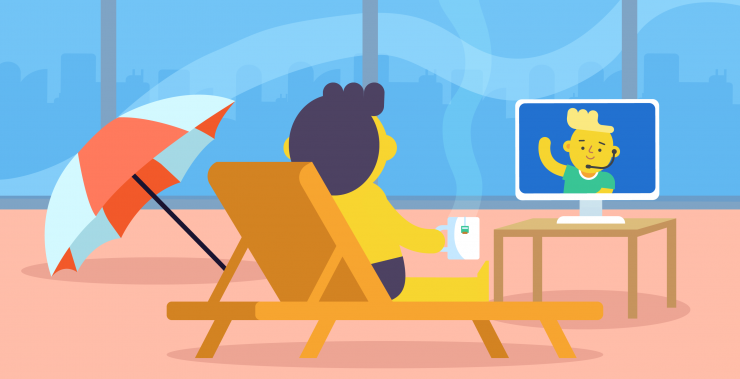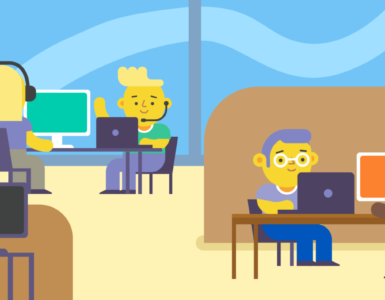If you feel like you need a vacation after a vacation or just another day off after the weekend, you’re not alone. The transition get back to work after seasonal holidays is always stressful. After soaking up the sun and lounging on the sand, making the switch from diving into the waves to diving back to work may feel daunting.
According to some studies, post-trip happiness doesn’t last long, unless you had an extremely relaxed holiday over quite a long time before you get back to work. Because people try to make the most of their seasonal holidays or other vacation time, most office workers are back to work feeling exhausted.
A major challenge for everyone returning to work after a “happy holidays” season is increasing, or at least maintaining productivity at work.
If this sounds familiar to you, check out our tips on how to get better at “vacation recovery”.
Getting back to work or home is the last thing you focus on when planning your time away. However, it is one of the most important things you can do before going away.
The more loose ends from assignments you manage to tie up in advance, the better. Yes, work never ends. But if you deal with pressing issues at work before heading on seasonal holidays or other vacations, your homecoming won’t feel so overwhelming, as you will already have some progress to make when you are back to work.
Moreover, taking seasonal holidays with a clear conscience and a clear head is priceless.
Don’t forget to turn on your out-of-office message, either. By doing so, you don’t just notify colleagues and partners of your absence. You also let them know you will need a little extra time to get back on track and will dive back in when you are back to work.
7 Tips on how to be productive at work after seasonal holidays
Make a to-do list of tasks and rank them in order of importance
There is no point in trying to complete all of your tasks in one day. The impossible goal of doing everything as soon as we return is one of the reasons why we dread the very idea of coming back to work. Let’s face it: ranking things in order of importance is difficult because almost everything at work that adds up appears to be top priorities.
The less crucial tasks are easier to determine and this can be a good place to start. For example, by using the Eisenhower Matrix, you can break down day-to-day tasks and larger projects into one of the following:
- Urgent and important tasks (they need to be taken care of as soon as possible)
- Not urgent and important tasks (you need to find time for them right after the top priority tasks are done)
- Urgent and unimportant tasks (delegate them to someone)
- Not urgent and unimportant tasks (forget about them for a while)
Once you’re done with prioritization, start working through your tasks and assignments step by step.
By mapping out several things you have to do each day, you will get a better sense of direction, greater peace of mind and clarity. This will help empower you to brush off the anxiety regarding where and how to start your work.
It’s better to take things a bit slower and double-check everything, rather than rushing to complete, and then having to redo the entire task afterward.
Start your work with clear and actionable tasks when you get back to work
Try to strike a balance between tasks and choose the first assignment to work on wisely. Starting with the most difficult projects is good, but remember, don’t overestimate your capacity and don’t underestimate what is important.
First and foremost, ask colleagues to walk you through anything you may have missed and get properly acquainted with the current situation once you are back to work.
Warm yourself up with routine tasks and ones that take less effort and brainpower. Read documents, start preparing reports and refresh yourself with previous stages of any project in question. Don’t jump into things that need too much scrutiny and concentration right away.
Consider a smoother transition to full-scale work via small and determined tasks. At the end of the day, there is nothing more satisfying than a true sense of accomplishment at work.
If possible, avoid meetings, sales, and negotiations on the very first days after you are back to work from seasonal holidays or vacations. Taking up complicated and unstructured tasks will burn you out immediately.
Set realistic expectations for yourself
Don’t feel pressured to catch up on everything at once. After a break, it’s tempting to dive into a mountain of emails and unfinished projects, but this approach can lead to burnout. Instead of trying to tackle all your tasks immediately, focus on what’s most urgent and manageable. Break your work into smaller, more achievable pieces and give yourself time to adjust back into the rhythm.
Start with the high-priority items and give yourself realistic timelines for completing tasks. Setting realistic goals will help you regain your momentum without feeling overwhelmed. This allows you to approach your work step by step, building confidence as you go. Remember, it’s okay to take things slow at first; easing back into your routine will make the transition smoother and more sustainable.
Take short breaks throughout the day
Don’t try to power through your tasks without taking breaks. Breaks help you recharge and prevent burnout, which is especially important after returning from a vacation. Step away from your desk for a few minutes, take a quick walk, or practice some deep breathing exercises. This will help you refocus, reduce stress, and boost productivity without feeling overwhelmed.
Try to make your breaks consistent, so your brain gets the chance to reset throughout the day. If possible, set a timer to remind you to take a break every couple of hours. A well-timed break can be just as productive as working nonstop. Whether it’s a 5-minute pause to stretch or a 10-minute coffee break, these short moments of relaxation will help you stay refreshed and focused for the rest of the day.
Create a home time ritual for work
Create a ritual around returning home from work each and every day after your return from seasonal paid holidays or other vacations. Always remember the sense of relaxation you will experience when you walk through your front door.
Consider organizing a meet-up with some friends. Consider how pleasant it would be to stroll through your favorite park for a cup of coffee. Shopping (assuming you didn’t spend all of your money during the “happy holidays” season) may also be a good way to celebrate your return home. Look at concerts, exhibitions, or parties in your area and consider booking them in advance so you have something to look forward to.
Ultimately, it is important for you to schedule things you find enjoyable for your return home in the subsequent weeks and months. This will give you something to work toward and look forward to, which is important to help you get through any post-holiday blues.
Don’t be afraid to treat yourself after your vacation. It doesn’t have to cost a fortune, but it is important for you to always have something enjoyable to look forward to, both at home and on holidays.
Clean up and organize your living space before you are back to work
Clean up your home and sort out any mess before you get back to work. Find the right place for the souvenirs on the shelf, water the plants, feed the dog, and hang your washing.
Complete all the mundane household chores and tasks that may otherwise distract you during the workday. Prepare your work table and sweep off the dust, get comfortable in your chair, grab a cup of coffee and some water, and get in the right mindset to start and be productive.
Get started with work and go through any important messages and emails you may have accrued over the course of your holiday. It is important that you prioritize what is most important, so it doesn’t linger in your mind.
Don’t hesitate to check in with co-workers, though. Small talk is always a great mood booster for everyone, including yourself.
Hold onto memories of your holiday when you get back to work
Vacation is a state of mind as much as it is a place to fly away to. Yes, your body may be sitting in a stuffy office and you may be burdened and overwhelmed with work, but pleasant memories from the remote corners of the world can always inspire your soul.
Consider using scented candles and decorating your workspace with some pictures to remind you of the highlights of your recent holiday. Try to cook dishes that stole your heart on holiday and just let the memories warm you whenever you feel it is needed.
Don’t get upset because vacation is over and if possible, start planning the next one!
If buying a ticket to a new and exciting destination is not an option right now, how about a small daycation in a few weeks?
Much like a vacation itself, returning to work requires some degree of preparation and patience. Post-holiday blues are a common part of life.









Add comment